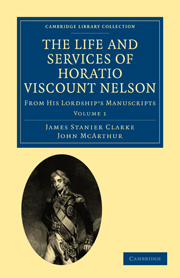CHAP. II
Published online by Cambridge University Press: 07 September 2011
Summary
The eventful period, on which we are now entering, requires to be elucidated by every document that may throw light on those occurrences which have had such an effect on the general aspect of Europe. The connexion of our American colonies with the mother country was at length destroyed by the assistance and machinations of France, insidiously conducted by her marine minister, M. de Sartine: who thus unwarily prepared the misfortunes and ruin of his own monarch; and was, in great measure, the cause of that political earthquake which subsequently destroyed the independence of nations, and shook the pillars of the civilized world.
Thus arose that great contest between a commercial and a military power, on the result of which so much of the happiness and liberty of mankind in general eventually depends. The navy of Great Britain, at length deservedly esteemed the natural support of its country's independence, became the only barrier which afflicted Europe could oppose to the overwhelming and devastating ambition of France: and consequently the dignity and importance of our naval power began to bear down the obstacles, and to abate the prejudices, which originated in the infatuation of statesmen.
In the year 1778, with which our second period commences, the country lost one of its ablest and most sanguine supporters, by the death of Lord Chatham; whose last words breathed that decided anti-gallican spirit which survived in Nelson. After reprobating the treacherous conduct of France, that dying patriot exclaimed, with a blaze of eloquence, Can we, my lords, forget that we are Englishmen?
- Type
- Chapter
- Information
- The Life and Services of Horatio Viscount NelsonFrom His Lordship’s Manuscripts, pp. 38 - 85Publisher: Cambridge University PressPrint publication year: 2010First published in: 1840

